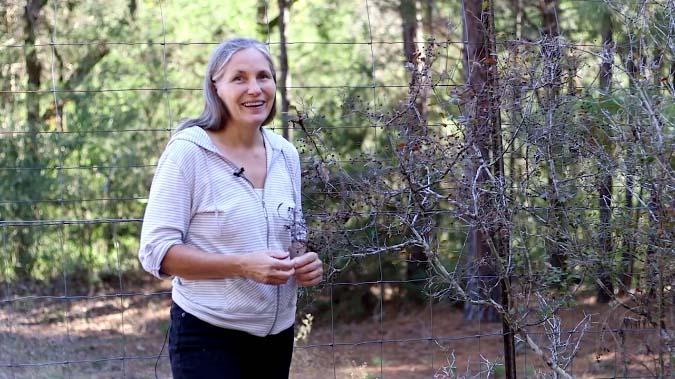Today, I want to talk a little bit about plant communication, a little bit about gratitude, and a litle bit about one of my favorite wild plants: the farkleberry. It’s a blueberry that’s native to Texas.
Actually, some people call them sparkleberries, because apparently the Boy Scouts had too good of a time with the name farkleberry! But I still call them farkleberries. They’re just delicious little berries. They’re a little bit mealy, but a little bit sweet. If you cut sugar out of your diet like I have, you’ll find that it’s very nice to be able to enjoy some sweets like these.
Now, whenever I harvest anything—especially wildcraft—I keep in mind that this is a living plant that has produced things that I’m taking. In fair exchange, I want to express my gratitude to this plant for producing these berries and letting me pick and eat them.
The number one way to do this—the thing that plants would love the most—is to simply urinate at the base of the plant. You have a highly available form of nitrogen in your urine, and plants really appreciate that. Of course, that may not be passable in a lot of places, like public parks or maybe even your backyard. Or you might not be comfortable yet doing that kind of thing.
So, if you have a canteen of water with you and you’re living in dry country, another great thing you can do is use a small bit of water to express your gratitude.
Another thing I like to do every couple of years is grow some tobacco. Tobacco is a plant that has been used historically by the native peoples here in America. It can make a great fertilizer. Just take a pinch, sprinkle it on the soil around the plant, and say, “Thank you so much. I appreciate your fruits.” The plants don’t understand your words, but they get your intent.
Just making an offering of some sort is immensely beneficial in that relationship.
One of the kind of “woo-woo” things that I found out about this is that the more I do it, the more I’m suddenly able to see farkleberry bushes when I couldn’t see them before. It’s almost as if they know that I’m looking for them, and they call to me. Again, a little bit mystical, but isn’t plant communication in general?
I’d love to hear your experiences with this type of thing. Leave me a note in the comments! 🙂
Marjory Wildcraft is the founder of The Grow Network, which is a community of people focused on modern self-sufficient living. She has been featured by National Geographic as an expert in off-grid living, she hosted the Mother Earth News Online Homesteading Summit, and she is listed in Who’s Who in America for having inspired hundreds of thousands of backyard gardens. Marjory was the focus of an article that won Reuter’s Food Sustainability Media Award, and she recently authored The Grow System: The Essential Guide to Modern Self-Sufficient Living—From Growing Food to Making Medicine.









COMMENTS(11)
Ilove the way you respect nature.My mother told me, you must allways talk to plants .They love the breat and smell of us. Then they grow big 🙂 After a long life as a farmer, growing my own vegetables,flowers,herbs and medisin i have now retired. Living half a year in Norway and Spain it is difficult to figure out what to do with the gardening, Best thing in the world is to pick your own fruit and vegetables,clean and fresh! Thank you for the great work you do.
Hi Anne,
Yes, if you are moving between places and can’t quite get an annual garden going and finished, I recommend ‘forest gardening’ or edible landscaping. Plant things that will be in season when you are there. That way you’ll always have things to eat.
I didn’t know what you were talking about when you said farkleberries. Then you explained and I understood. I just call them wild blueberries. I have them growing all over my land and everywhere I have ever lived in Alabama. I show them to people and tell then not to cut them down because they are food for people and animals. They are good but very seedy. Thanks for talking about them.
The first time I heard of this, I thought it sounded a little weird. But then I thought to myself, what’s wrong with being grateful? Whether you believe in the”woo-woo” stuff or not, generating an attitude of appreciation is never a bad idea. It felt awkward at first but I talk to the plants a lot now. I try to send them some “positive energy”.
That is totally it Scott! Even if really doesn’t do anything for the plant (although I do believe it does), being grateful makes you feel better – and that is super important. There are tons of studies that show that people who are more thankful have less cortisol and other stress related things that can be measured in your blood.
3
3????
I had pasted this in; not sure what went wrong there!
Last year we found a hillside totally covered in these! Its only about 15ish minutes from our house (Boston Mtns. of the Ozarks) farther into the woods and on our friend’s property, score! They are near an old abandoned hippy homestead, so we first thought they where blueberries until the next visit when we realized how tiny they where. I had never seen them, but had herd of wild blueberries. Its nice to know their name, now! We barely got a taste of the first ones that where ripening, & missed them full on fruiting, so I want to make sure to visit them often & time that right this year!
I first learned about the practice of Thanking the Plants a few years ago when I got ahold of a few thrift store books on Native American esp. Cherokee beliefs, practices, & medicines. I have a lot of native blood in me -Blackfoot, Sioux, & Cherokee at least- but, tragically, the culture was not passed down and was largely lost for my family. Being able to figure out how to tap back into that old native lifestyle & understanding is very important to me and my ever growing love for & passion to know more about our Green Allies at least partially stems from this. The fact that they are all leaving our world terrifies my soul in a way I cannot explain and more than any political, financial, or social issue ever could worry me. But I’m way off topic, now!
Since moving to our farmstead two years ago, I have developed the habit of frequently taking a moment to lovingly touch & give gratitude to a plant before harvesting from it, but I often felt guilty for not being prepared with an actual physical gift… So, I’m rather thrilled that you helped me make the connection that we are all carrying around a bit of ‘nitrogen gift’ we can happily give!
Thank you!
Lucky you Chimney! For finding such a stash… Exploring your neighborhood and knowing what is growing where, when it ripens, and how to harvest and prepare it is a super form of preparedness. And it is how we used to live. In Native American traditions, certain food producing trees where considered the property of a family. They would tend it and care for it and be the ones who got to harvest it.
Great info although I can’t use it where I live. Who knows though some day I may be able to.
This is great!!! I admit, I was completely thrown off for a second when I heard you say that! I’m used to intrinsicly thinking/feeling the same way about communicating with plants and showing appreciation, but don’t hear many people brave enough to talk about it! I think you’re super cool for doing so! Have you ever heard of the book series “The Ringing Cedars of Russia?” I think you’d dig it!
Marjorie, we thank our Creator, for all good gifts come from God. He gives the increase, which is not from the creation. We are saddened by your encouragement to your students to offer pagan sacrifices. Jesus Christ is the only sacrificial atonement for our sin. Otherwise, the information in these first few videos has been appreciated. Thank you. (I do also have native American blood, but I have been redeemed from false tribal gods and from other new age philosophies. I hope you and your teachers and students will turn away from these godless myths to the one true God, giving gratitude to Him alone.) In Christ, because of His grace alone, Linda Burris